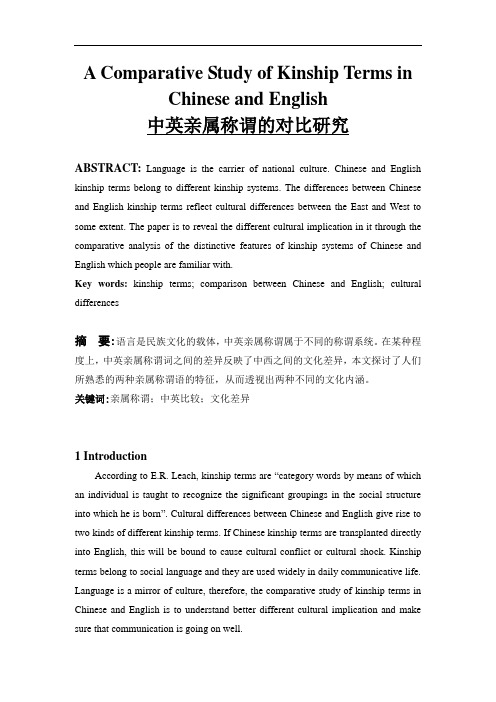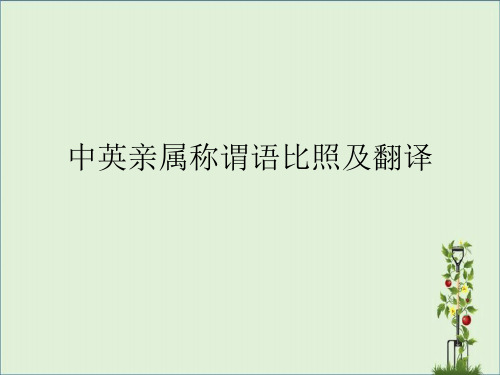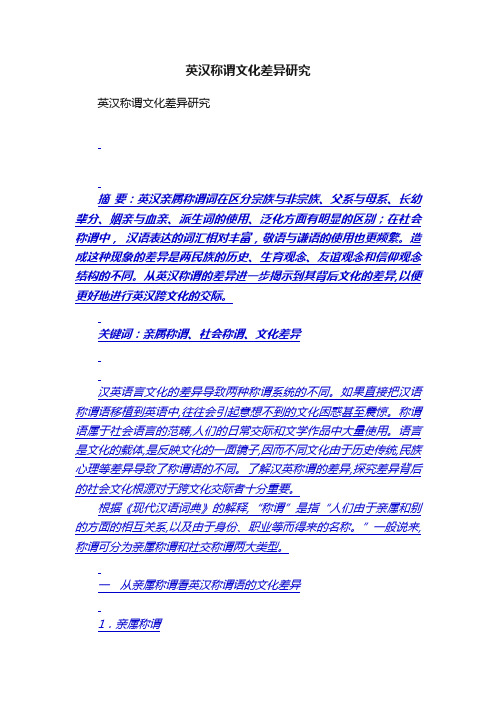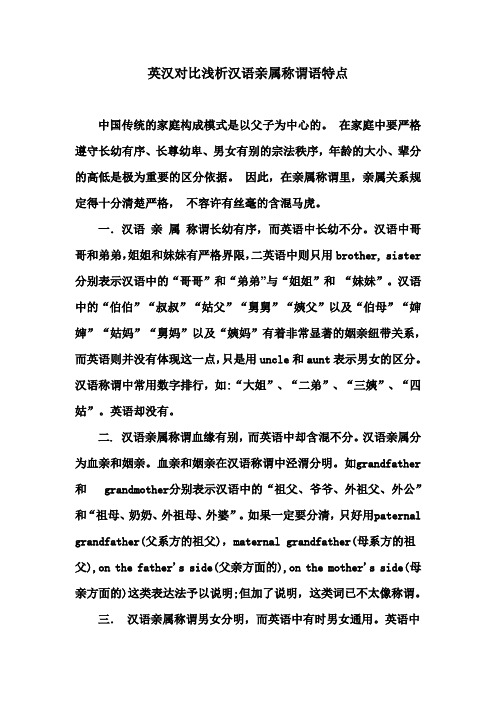中英亲属称谓语对比研究概要
汉英亲属称谓语的文化对比研究

参考内容
引言
亲属称谓是人际交往中不可或缺的一部分,它反映了一个社会文化对于家庭、 亲属关系的理解和定义。中国和韩国同属东亚文化圈,拥有着相似的儒家文化传 统和社会价值观念,然而在亲属称谓方面却存在着一些显著的差异。本次演示旨 在通过对比分析汉韩亲属称谓的表达方式、使用场景、文化内涵等方面,深入探 讨其异同之处和形成原因,并通过具体案例分析汉韩亲属称谓在实际运用中的特 点。
长幼有序:汉语中的亲属称谓语严格遵循长幼有序的原则,而英语中的亲属 称谓语则相对灵活;(4)性别区分:汉语中的亲属称谓语往往区分性别,而英 语中的亲属称谓语则不作性别区分。
这些差异反映了汉英两种文化对家庭、亲属关系的不同观念和价值取向。例 如,英语国家注重个人主义和独立性,因此其亲属称谓语相对简单、平等;而中 国注重家庭主义和等级观念,因此其亲属称谓语更为复杂等级分明。此外,汉英 亲属称谓语的差异还体现了两种文化在婚姻制度、性别角色等方面的差异。
3、文化内涵
汉韩亲属称谓都受到传统文化的影响,其中最明显的是等级观念。中国的亲 属称谓中体现出严格的等级观念,长幼、嫡庶、男女等差别明显,而韩国的亲属 称谓中虽然也强调等级,但相对而言较为平等。另外,中国的亲属称谓还体现了 血缘和婚姻关系的重要性,而韩国的亲属称谓则更加强调感情因素。
案例分析
让我们以一个具体情境为例来分析汉韩亲属称谓的运用特点。假设一个中国 留学生在韩国遇到一个韩国人,两人聊起了家庭和亲属的话题。这个中国留学生 用到了以下的韩语亲属称谓:
文献综述
汉英亲属称谓语的研究起步较早,已有大量研究成果。然而,大多数研究集 中在语言学和人类学领域,且主要从词汇、语法和语用等方面进行研究,很少涉 及文化因素。此外,以往研究多采用零散的个案分析,缺乏对整体情况的把握。 因此,我们需要一种全新的研究视角和方法,以全面深入地探究汉英亲属称谓语 的文化差异。
英文版中英亲属称谓的简单比较和分析

Eskimo kinship term system, which is a typical example of classification, puts more emphasis on the nuclear family which of only father, mother, son, daughter, brother and sister. It also ignores the distinction between father's side and mother's side.
According to the linking function of human communication, communication is used to establish relationships between the individual and the environment, and that people use symbols to create a desired image to facilitate this linking to the environment. Thus, the individual is consubstantial with society.
汉英称谓语的对比研究

206作者简介:吴珊珊(1997— ),女,汉族,湖南郴州人,硕士。
主要研究方向:专业英语及跨文化交际。
称谓是指人们由于亲属和别的方面的相互关系,以及由于身份、职业等而得来的名称。
称谓语既是语言现象,也是社会、文化现象。
在任何语言中,称谓语都担当着重要的社交礼仪作用。
但由于文化的差异,中国与英语国家的称谓语用法有所不同。
如果不了解其中的差异,可能会造成双方误解,甚至导致沟通失败。
因此,掌握汉英称谓语的差异有助于人们在一定程度上减少语用错误、促进跨文化交际。
本文将从以下四个方面对汉英称谓语进行对比分析:一、人称代词(一)第一人称代词人称代词指的是对话者之间互相称呼的代词。
英语国家的人们在称呼自己时,通常采用第一人称代词“I”;如果需要强调自己,可以使用反身代词“Myself”。
相反,汉语中第一人称代词的形式比英语多。
汉语中的中性第一人称代词是“我”,相当于英语中的“I”。
不过,古代中国人为了礼貌,常用自谦代词来称呼自己,比如“晚生”、“卑职”等[1]。
以中国古典小说《红楼梦》中的一段对话为例。
贾珍言道:“昨承冯大爷示知老先生人品学问,又兼深通医学,小弟不胜钦仰之至。
”张先生道:“晚生粗鄙下士,本知见浅陋,昨因冯大爷示知,大人家第谦恭下士,又承呼唤,敢不奉命。
”Jia Zhen said, “Yesterday, I was overwhelmed with admiration by all Mr. Feng told me of your character, learning, and profound knowledge of medicine, sir.”“I am simply an ignorant layman,” replied Dr. Zhang. “But when I heard yesterday from Mr. Feng that Your Lordship’s family is considerate to ordinary scholars and had condescended to send for me, how could I disobey your orders?”A dream of red mansions (Yang and Dai, 2001)[2]“张先生”是一个知识渊博的人,享有很高的声誉,但他还是用“晚生”来称呼自己。
A Comparative Study of Kinship Terms in Chinese and English 中英亲属称谓的对比研究

A Comparative Study of Kinship Terms inChinese and English中英亲属称谓的对比研究ABSTRACT:Language is the carrier of national culture. Chinese and English kinship terms belong to different kinship systems. The differences between Chinese and English kinship terms reflect cultural differences between the East and West to some extent. The paper is to reveal the different cultural implication in it through the comparative analysis of the distinctive features of kinship systems of Chinese and English which people are familiar with.Key words:kinship terms; comparison between Chinese and English; cultural differences摘要:语言是民族文化的载体,中英亲属称谓属于不同的称谓系统。
在某种程度上,中英亲属称谓词之间的差异反映了中西之间的文化差异,本文探讨了人们所熟悉的两种亲属称谓语的特征,从而透视出两种不同的文化内涵。
关键词:亲属称谓;中英比较;文化差异1 IntroductionAccording to E.R. Leach, kinship terms are “category words by means of which an individual is taught to recognize the significant groupings in the social structure into which he is born”. Cultural differences between Chinese and English give rise to two kinds of different kinship terms. If Chinese kinship terms are transplanted directly into English, this will be bound to cause cultural conflict or cultural shock. Kinship terms belong to social language and they are used widely in daily communicative life. Language is a mirror of culture, therefore, the comparative study of kinship terms in Chinese and English is to understand better different cultural implication and make sure that communication is going on well.2 Comparison between Chinese and English kinship terms2.1 Pure kinship termsDue to historical and cultural reasons, Chinese culture has many fine-grained terms for different types of family relationships. Compared with Chinese kinship terms, English kinship terms are quite a few. The following table will reflect differences between them.Table 2-1 pure kinship terms in Chinese and EnglishBy analyzing the above table, it is obvious that the two kinship terms havecertain common characteristics; nevertheless, they express differences between Chinese and English kinship terms to a great extent. Firstly, only a few pairs of kinship terms have the one-to-one correspondent relationship in English and Chinese. For one thing, English “father” and Chinese “fuqin” are both contrasted with English “mother” and Chinese “muqin”. English “son” corresponds to Chinese “erzi”, and the term “son-in-law” has also one-to-one correspondent relationship. However, a kinship term in English may refer to several kinship terms in Chinese in most cases. For example, English “uncle” can replace Chinese “bofu, shufu, jiufu, yifu, and gufu”; the same is true with the English term “aunt”which carries meaning of “bomu, shenmu, jiumu, yimu” and gumu” in Chinese. Secondly, Chinese people value the concept of sex in kinship terms; however, western people are an exception. The English word “cousin”carries no semantic meaning of sex; it is not clear from the word itself if one’s cousin is a man or a woman. Besides, Chinese people attach great importance to the position in the family hierarchy while western people usually break the boundary of respecting for seniority. Take the word “brother” for example, in Chinese, it refers to “elder brother”or “younger brother”, but in western countries, the younger generation usually address the elder generation in the clan directly by name. Lastly, in Chinese, people pay more attention to the differences between consanguineous and affined relationships about kinship terms, with consanguineous relation we have the label of “ tang”, while with affined relation we have the label “biao”. According to the sex and the age to ego, father’s bothers’ sons are called as “tangge” or “tangdi”. In Chinese, “bofu, shufu, jiufu, gumu, yimu”belong to consanguineous relations, but “gufu, yifu, bofu, shenmu and jiumu” are incorporated into affined relations. On the contrary, western people don’t think highly of consanguineous or affined relations about kinship terms, for instance, parents’ brothers or parents’ sisters’ husband are all addressed as “uncle” and “aunt” respectively.2.2 Expansive kinship termsKinship terms which are used to address people who have neither consanguineous nor affined relationships with ego is called expansive kinship terms in Chinese. The frequent use of expansive kinship terms possesses Chinesecharacteristics, because these terms can help to form an intimate terms between conversationalists, thus shortening the distance between them and enhancing communicational effects and friendship. In Chinese, we usually call order people whom we aren’t acquainted with as “grandfather” or “grandmother” out of politeness. In addition to this, with respect to positional titles, we often hear these addresses, such as “Uncle Police”,“Aunt Conductor”. However, if these terms are applied to English, the result will be just the opposite.There is no denying the fact that some traditional families in central district of England always call non-relative members “aunt”or “uncle”. For example, parents’friends may be addressed as “Uncle Tom” or “Aunt Lily”. Although there are certain expansive kinship terms in English, their frequency of use is far inferior to Chinese.3 The cultural differences in both kinship terms3.1 Different family structuresMany cultural differences exist in family structures and values. In some cultures, the family is the center of life and the main frame of reference for decisions. It’s well- known that ancient China was a feudal agricultural country. People lived on tilling the land and settled in those places with rich soil. In this case, self-supporting natural economy gradually took shape. However, people had to labor together and had a collective life owing to the low productivity. Thereupon, they lived together according to consanguineous or affined relations and formed an extended family which had exceedingly complex relations between family members. Accordingly, complicated kinship terms came into being in order to make the daily life progress smoothly.With the advent of the Industrial Revolution period, manpower in Anglo-American countries was no longer the important factor in the process of working. Therefore, an increasing number of nuclear families began to form and played a leading role in the current society. Generally speaking, a nuclear family has very few members, only parents and offspring. The distinctive feature of the family structure is easy and loose, which decides the poverty in quantity of kinship terms. 3.2 Different value orientationsIn history, China had been a feudal patriarchal society which had extremely rigidfeudal hierarchy spanning over 2000 years. In this case, the formation of the clannish system is inevitable; meanwhile, the use of kinship terms is a mirror of the clannish system. The clannish system claims for respecting for seniority in a family. The younger generation should not call the elder generation directly by names, while they are supposed to address them according to the position in the family hierarchy. Furthermore, Chinese attach importance to the traditional ideal that ‘let the king be a king, the minister be a minister, the father a father and the son a son’. What’s more, different members are endowed with different rights and fulfill different obligations. Consequently, kinship system is very distinct and strict. Furthermore, an outstanding characteristic of feudal hierarchy is the deep-rooted idea that males are better than females, resulting in making a distinction between paternal and maternal kinship terms. The typical example is “wai” and “biao” which express the differences in consanguineous and affined relations.On the contrary, the concept of capitalism and equality had a great impact on western people; As a result, they advocate individualism, lay stress on self-consciousness and pay attention to self-interest. There is not an evident boundary between the elder and the younger in kinship terms. Ordinarily, they don’t use the kinship terms “brother” and “sister” to call each other, instead of calling one another by names. Besides, this phenomenon is frequently common among different generations, which embodies the concept that all men are equal. Meanwhile, this can make the relations between family members more harmonious and closely united. Hence, English kinship terms are lacking in quantity and their semantic meanings are extensive.3.3 Different politeness principlesInfluenced by the moral and ethical concepts, Chinese must chose suitable terms to address others according to the rank and identity. Chinese people extremely lay emphasis on the harmonious and friendly terms in the process of associating with others, thus expansive kinship terms are applied widely to a variety of social occasions in view of expressing politeness and kindness. There is no doubt that this will go a long way to communication and help to form a good interpersonal relationwith others. However, the kinship terms should not be abused and must be in accordance with social occasionsConversely, western people seem to be indifferent to courtesy principles, kinship terms are seldom used to call non-relative people even for family members. They are prone to address others by names regardless of the rank and identity. This phenomenon expresses intensely their hope of getting rid of differences in social status; at the same time, interpersonal relations are tending towards equality .Therefore, expansive kinship terms in Chinese should not be used into English; otherwise, interpersonal relations will be in chaos, leading to a failure of communication.3.4 Different blood relationsIn Chinese, people value consanguineous relations owing to the effect of principle of feudal moral conduct that “t he three cardinal guides and five constant virtues”. Patriarchal and colossal social organizations, namely extended families, were beginning to take shape in China going through a time-honored rule of feudal society. In this case, the basic social unit is a clan rather than an individual. Accordingly, an individual has to be subordinated to the clan with the result that Chinese culture has many fine-grained terms and there are many differences between the paternal side and maternal side.In contrast, commercial culture played a leading role in western history. Constant emigration and colonization took place during the course of their fighting with the nature. Under the circumstances, the patriarch system based on consanguineous relations took the place of the social contract system on the basis of property relations. By the same token, the ideal that everyone is equal replaced the obsession of hierarchy. Therefore, English kinship terms give expression to equality in personality, especially for addressing rel atives on the father’s side or mother’s side.4 ConclusionFor what has been discussed above, we may reasonably draw a conclusion that there are many differences between Chinese and English kinship terms. To sum up, Chinese kinship terms are meticulous, strict and complicated, while the distinguishingfeatures of kinship terms in English are simple, loose and general. These differences in both kinship terms reflect precisely the different cultural implication. Understanding the differences between the two kinds of culture is beneficial to our English study. What’ more, it may help us to heighten the quality of communication and promote cross-cultural communication.Bibliography[1]Song Honglian. “A comparative study of the cultural connotations between Englishand Chinese kinship terms”. Journal of Language and Literature Studies,2010,V ol.6:106-108.[2]Xu lisheng.“Intercultural Communication In English”. 2nd ed. Shanghai: Shanghai Foreign Language Education Press, 2009.[3]裘燕萍.汉英亲属称谓系统的对比研究[J].绍兴文理学院学报,2002,第22卷第2期:84-88.[4]邵琳娜.英汉亲属称谓语差异浅析[J].科技文汇,2008,第10期:250-251.[5]徐红.从英汉亲属称谓看其所蕴涵的文化差异[J].贵州教育学院学报,2006,第22卷第1期:76-78.。
中英亲属称谓语对比研究概要

father
uncle aunt
mother
cousins sister brother: Son〔-in-low〕/daughter 〔-in-low〕 niece /nephew
• Grandfather:祖父,外祖父 GrandmotlIer:祖母,外祖 母
• Father:父亲
father-in-law:公公;岳父
•
英汉亲属称谓比照
在现代汉语中,亲属称谓大都能把其身 份说明一览无余 如辈份(父辈:伯、舅;同辈:哥、妹、堂弟), 父系或母系(姑、姨),直系或傍系(孙、侄孙), 年龄的大小(叔、伯、哥、弟)及血亲或姻亲 (哥、嫂子、姐、姐夫)。
在英语中,此类称谓则比较笼统、模糊, 一词多义,掩盖面广。除了辈份清晰外,其他 关系只能从上下文中认真推敲或当面询问。
中英亲属称谓语比照及翻译
依据《现代汉 语词典》的解 释,“称谓”是 指“人们由于
亲属和别的 方面的相互 关系,以及由 于身份、职 业等而得来 的名称。”一 般说来,称谓可
分为
亲属称谓 社交称谓
• 称谓语的功能等值 • 包惠兰认为称谓语的功能等值表达在四个方面: • 〔1〕表达称谓者的感情 • 〔2〕传达称谓者的语气 • 〔3〕表达交际者的身份 • 〔4〕反映交际场合的特点
• To express her gratitude, Mrs. Wang bought a pack of filter cigarettes and insisted that he accept it.
• 3) 前不久,王嫂又给他介绍一位叫蓉蓉的姑娘。
• Not long ago, Mrs. Wang introduced him to another girl, called Rongrong.
英汉亲属称谓语比较

(great)Grandfather (great) Grandmother
Father Uncle Aunt
Son (-in-low) Daughter (-in-low) Cousin Niece /Nephew 二、英汉亲属称谓语存在的差异 (一)英汉亲属称谓语的语义差异 英汉亲属称谓语并不是完全一一对应的。英语亲属称谓语比
中国人喜欢选用更加亲密的亲属称谓语来表达尊重和礼貌, 如称嫂子为姐姐。而这样的亲属称谓语往往不被英语国家的人所 接受。
(三)英汉亲属称谓语的文化差异 等级观念以及亲情观念上的差异构成了英汉亲属称谓语在文 化上的差异。 一直在中国社会历史中占据统治地位的儒家思想深深的影响 了汉语中的亲属称谓语。在采用以“仁”和“礼”为精髓的儒家思想 下建立的宗法制度的原则确立的礼制,恰好起到了标识社会成员 身份尊卑的作用。汉语亲属称谓语中的长幼,尊卑的区分,就是这 种制度的体现。而英语国家通常直呼其名,即使年纪比自己大也不 例外。这一点体现了他们注重交往中的平等以及坦诚,并未像汉语 那般注重长幼尊卑。这刚好与他们自由、平等的观念深入人心所营
英汉称谓文化差异研究

英汉称谓文化差异研究英汉称谓文化差异研究摘要:英汉亲属称谓词在区分宗族与非宗族、父系与母系、长幼辈分、姻亲与血亲、派生词的使用、泛化方面有明显的区别;在社会称谓中,汉语表达的词汇相对丰富,敬语与谦语的使用也更频繁。
造成这种现象的差异是两民族的历史、生育观念、友谊观念和信仰观念结构的不同。
从英汉称谓的差异进一步揭示到其背后文化的差异,以便更好地进行英汉跨文化的交际。
关键词:亲属称谓、社会称谓、文化差异汉英语言文化的差异导致两种称谓系统的不同。
如果直接把汉语称谓语移植到英语中,往往会引起意想不到的文化困惑甚至震惊。
称谓语属于社会语言的范畴,人们的日常交际和文学作品中大量使用。
语言是文化的载体,是反映文化的一面镜子,因而不同文化由于历史传统,民族心理等差异导致了称谓语的不同。
了解汉英称谓的差异,探究差异背后的社会文化根源对于跨文化交际者十分重要。
根据《现代汉语词典》的解释,“称谓”是指“人们由于亲属和别的方面的相互关系,以及由于身份、职业等而得来的名称。
”一般说来,称谓可分为亲属称谓和社交称谓两大类型。
一从亲属称谓看英汉称谓语的文化差异1.亲属称谓亲属称谓指的是以本人为中心确定亲族成员和本人关系的名称,是基于血亲姻亲基础上的亲属之间相互称呼的名称、叫法。
它是以本人为轴心的确定亲属与本人关系的标志。
由于人类的繁衍生息是相通的,各个民族都具有表示家庭成员关系的亲属称谓系统总体来说,汉语称谓语要比英语称谓语繁杂细致得多。
1.1 汉英亲属称谓异同在现代汉语中,亲属称谓大都能把其身份表明一览无余,如辈份(父辈:伯、舅;同辈:哥、妹、堂弟),父系或母系(姑、姨),直系或傍系(孙、侄孙),年龄的大小(叔、伯、哥、弟)及血亲或姻亲(哥、嫂子、姐、姐夫)。
而英语里的此类称谓则比较笼统、模糊,一词多义,覆盖面广。
除了辈份清楚外,其他关系只能从上下文中仔细推敲或当面询问。
如sister姐妹同为一词,年龄大小不分;grandmother既指奶奶也指外婆,父系、母系不分;uncle可指叔、伯、舅、姑父,年龄、父系、母系不分。
英汉对比浅析汉语亲属称谓语特点

英汉对比浅析汉语亲属称谓语特点中国传统的家庭构成模式是以父子为中心的。
在家庭中要严格遵守长幼有序、长尊幼卑、男女有别的宗法秩序,年龄的大小、辈分的高低是极为重要的区分依据。
因此,在亲属称谓里,亲属关系规定得十分清楚严格,不容许有丝毫的含混马虎。
一.汉语亲属称谓长幼有序,而英语中长幼不分。
汉语中哥哥和弟弟,姐姐和妹妹有严格界限,二英语中则只用brother, sister 分别表示汉语中的“哥哥”和“弟弟”与“姐姐”和“妹妹”。
汉语中的“伯伯”“叔叔”“姑父”“舅舅”“姨父”以及“伯母”“婶婶”“姑妈”“舅妈”以及“姨妈”有着非常显著的姻亲纽带关系,而英语则并没有体现这一点,只是用uncle和aunt表示男女的区分。
汉语称谓中常用数字排行,如:“大姐”、“二弟”、“三姨”、“四姑”。
英语却没有。
二. 汉语亲属称谓血缘有别,而英语中却含混不分。
汉语亲属分为血亲和姻亲。
血亲和姻亲在汉语称谓中泾渭分明。
如grandfather 和 grandmother分别表示汉语中的“祖父、爷爷、外祖父、外公”和“祖母、奶奶、外祖母、外婆”。
如果一定要分清,只好用paternal grandfather(父系方的祖父),maternal grandfather(母系方的祖父),on the father's side(父亲方面的),on the mother's side(母亲方面的)这类表达法予以说明;但加了说明,这类词已不太像称谓。
三.汉语亲属称谓男女分明,而英语中有时男女通用。
英语中对父母亲的兄弟姐妹的子女共同使用一个称谓,即cousin,可表示汉语中的“表哥”、“表弟”、“表姐”、“表妹”、“堂哥”、“堂弟”、“堂姐”、“堂妹”。
四.汉语亲属称谓注重辈分,英语中则辈分淡化。
晚辈对长辈则只能严格按照其相应的称谓来进行称呼,直呼其名是万万不可的。
英语中对父辈甚至祖父辈直呼其名以示亲近。
称谓语实际上是一种具有浓厚民族文化色彩的语言现象,这种语言现象和民族文化相互渗透、相互作用。
- 1、下载文档前请自行甄别文档内容的完整性,平台不提供额外的编辑、内容补充、找答案等附加服务。
- 2、"仅部分预览"的文档,不可在线预览部分如存在完整性等问题,可反馈申请退款(可完整预览的文档不适用该条件!)。
- 3、如文档侵犯您的权益,请联系客服反馈,我们会尽快为您处理(人工客服工作时间:9:00-18:30)。
• Motherr:姬姐,妹妹Sister-in—law;嫂子.弟妹,小姑子。 小姨手
• Brother:哥哥,弟弟 Niece:侄女.外甥女
• Brother-in-law:姐夫,妹夫,小叔予,小舅子
• Uncle:伯父,叔父,舅父,姑父,姨父
• 7) 我孩子时候,在斜对门的豆腐店里确乎 终日坐着一个杨二嫂,人都叫伊“豆腐西 施”。
• When I was a child there was a Mrs. Yang who used to sit nearly all day long in the beancurd shop across the road, and everybody used to call her Beancurd Beauty.
• To express her gratitude, Mrs. Wang bought a pack of filter cigarettes and insisted that he accept it.
• 3) 前不久,王嫂又给他介绍一位叫蓉蓉的姑娘。
• Not long ago, Mrs. Wang introduced him to another girl, called Rongrong.
中英亲属称谓语对比及翻译
根据《现代汉 语词典》的解 释,“称谓”是 指“人们由于
亲属和别的 方面的相互 关系,以及由 于身份、职 业等而得来 的名称。”一 般说来,称谓可
分为
亲属称谓 社交称谓
• 称谓语的功能等值 • 包惠兰认为称谓语的功能等值体现在四个方面: • (1)表达称谓者的感情 • (2)传达称谓者的语气 • (3)体现交际者的身份 • (4)反映交际场合的特点
• Nephew:侄子,外甥
• Aunt:伯母,婶母,姑妈,姨妈,舅妈
• Cousin:堂哥,堂弟。表哥,表弟.堂姐,堂妹,表 姐.表妹
汉英对比点
• 主要在三个方面进行对比: (1)长幼辈分上的差别:英语不分长幼 (2)血亲和姻亲 (3)泛化差别
• 排行+亲属词 译为序数词+亲属词这样翻译, 虽然词汇上对应,但语义上并非完全对等, 汉语排行称谓所反映的民族风情,译语读 者仍是很难感受。由于两个民族的社会和 民族心理不同,汉语中习惯用排行称谓, 英语习惯用姓名称谓,翻译时可以把排行 称谓直接译为姓名称谓,那么这种翻译方 法就是归化法,也可以采用异化的翻译方 法,即序数词+亲属词
• 6)村人看见赵七爷到村,都赶紧吃完饭, 聚在七斤家饭桌的周围。
• Seventh Master Zhao’s arrival in the village made all the villagers finish their supper quickly and gather round Sevenpounder’s table.
• 5) 第一要算我们老栓叔运气;第二是夏三爷赏 了25两雪白的银子,独自落腰包,一文不花。
• Our Old Shuan was luckiest, and after him Third Uncle Xia. He pocketed the whole reward----twenty-five taels of bright silver--and didn’t have to spend a cent.
英汉亲属称谓对比
在现代汉语中,亲属称谓大都能把其身 份表明一览无余
如辈份(父辈:伯、舅;同辈:哥、妹、堂弟),父系或母 系(姑、姨),直系或傍系(孙、侄孙),年龄的大小(叔、 伯、哥、弟)及血亲或姻亲(哥、嫂子、姐、姐夫)。
在英语中,此类称谓则比较笼统、模糊, 一词多义,覆盖面广。除了辈份清楚外,其他 关系只能从上下文中仔细推敲或当面询问。
cousins sister brother: Son(-in-low)/daughter (-in-low) niece /nephew
Grandson/ granddaughter
• Grandfather:祖父,外祖父 GrandmotlIer:祖母,外祖 母
• Father:父亲
father-in-law:公公;岳父
• 1)一天,邻居王二婶不小心把钥匙锁在家里, 很多热心人都前来帮忙,但都无济于事。
• One day, through carelessness, Wang Er’s wife, one of the elderly neighbors, locked herself out.
• 2)王二婶感激万分,特意买来一盒过滤嘴香 烟,非要塞给他。
• 而说英语的国家则习惯于互叫名字。许多人 甚至直接用名来称呼父母的兄弟姐妹。
汉语称谓语介绍
• 汉语父系/母系称谓语归类表
父方
母方
姑
姨
叔(伯)
舅
姑父
姨丈
婶
舅妈
侄
甥
英语中称谓语介绍
(great) Grandfather (great) grandmother
father
uncle aunt
mother
• 8) 他的态度终于恭敬起来了,分明的叫道: “老爷!……”
• Finally, assuming a respectful attitude, he said clearly: “Master! …”
• 总之,汉语亲属称谓系统繁复多样,且直系与 旁系、血亲与姻亲、长辈与晚辈、年长与年 幼、男性与女性、近亲与远亲等都严加规范, 一一区分,其语义功能之细密、描述之精确,令 人叹为观止。相比之下,英语亲属称谓则相对 贫乏,而且指称宽泛、语义模糊,除区分辈分外, 亲疏、内外、长幼都可忽略不计。
• 例如:家庭成员之间,中国风俗兄弟姐妹一般 按长幼称呼,如大哥、三弟、四妹等。
如sister姐妹同为一词,年龄大小不分; grandmother既指奶奶也指外婆,父系、母系不分; uncle可指叔、伯、舅、姑父,年龄、父系、母系不分。 英语中的cousin一词更是无所不能,它不但年龄、父 系、母系不分,连性别也不分,囊括了堂兄、堂弟、堂 姐、堂妹、表哥、表弟、表姐、表妹等一系列汉语称 谓。 要准确地翻译这个词,必须置之于语境中考察。
